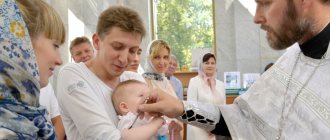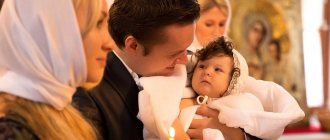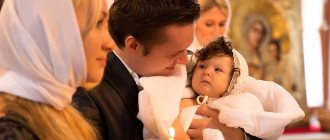Basic Church Requirements
Baptism is the first and most important sacrament of Christians. Through baptism a person becomes a member of the church and receives admission to other sacraments. The Russian Orthodox Church does not set a minimum age for religious conversion. At the initial stage of Christianity, baptism took place in a different order from the modern one. They prepared for it in advance, for several months. During this time, converts underwent a test of faith (fulfilling the commandments), learned the basics of Christian teaching, and performed rituals.
The introduction of the sacrament of the godparents into the ritual appeared when Christians were persecuted and were forced to hide their religion. The godfather was a religious man who knew closely the person who wanted to join the Christian faith. He was a guarantee to the Christian community that the person was sincere in his religious intentions. He was entrusted with the preparation for the announcement and he was required to be present at the sacrament.
The announcement took place in the church: the clergyman named by name the people who were allowed to attend services before baptism, with the exception of the sacrament of Holy Communion.
Among Christians of this period (II-IV centuries) there was a belief that during baptism all past sins were forgiven. For this reason, people tried to be baptized as late as possible. The Church fought against this superstition. When Christianity became the leading religion, they began to try to introduce them to the sacrament from infancy.
Since the child was not able to fulfill the conditions of the ritual, his godfather/godmother began to perform this for him. In 397, the Council of Carthage approved the rule according to which Christian parents who did not agree to baptize their infants were anathematized (excommunicated from the church).
The rite of announcement began to quickly be replaced by the baptism of babies. The timing of the rites of passage for infants and minors has varied throughout the millennia of Christian history. The Gospel of Mark quotes Jesus as saying that he who believes and is baptized will be saved (that is, the convert must be aware of his actions at baptism).
Gregory the Theologian explains his attitude to the baptism of children: if there is a danger to health, then they are baptized from the first days of life; for healthy children - baptism at the age of 3, when the child will be able to repeat after the priest and understand the words of the prayer.
Currently, clergy recommend that parents baptize their children as early as possible, so as not to frighten the child with an unfamiliar environment and a stranger who takes him in his arms and performs incomprehensible manipulations.
The Russian Orthodox Church has retained the procedure of announcement before baptism. Newly converted adults and children over 7 years of age are required to take it. When performing baptism on infants and children under 7 years of age, both parents and recipients must undergo preparation.
The child's godparent must be an Orthodox Christian. Atheists and people of other faiths (Muslims, Buddhists, Protestants, Catholics) are not allowed to participate in the rite of Baptism. The successor to the relatives of the father and mother must not only be baptized in Orthodoxy, but also attend church services, adhere to rituals and traditions, and know the basic prayers.
An Orthodox father and mother cannot be godparents for their children at the same time. A married couple cannot be godparents to one child. Consent to spiritual kinship must be conscious, since it means participation in the upbringing of the godson.
For this reason, minors cannot be appointed as foster children. Before the sacrament of Baptism, the priest can clarify how old the future godparent is. A minor baptized in Orthodoxy can be a spiritual guardian if he understands his responsibility before God.
Who to take as godparents? Can a grandmother be a godmother to her granddaughter?
Expanding deeper into the seemingly simple topic “Can a grandmother be godmother to her granddaughter”, it is worth noting the main thing - in such a sacred action as Baptism, a person’s body is immersed three times in water with the words invoking the name of the Holy Trinity - Father, Son and Holy Spirit . This thereby washes a person from original sin and from all other sins committed before baptism. Symbolically, this means that by the grace of the Holy Spirit a person is spiritually reborn and becomes a member of the Church and the Blessed Kingdom of Christ.
And in general, I wonder who can be taken as godparents? It must be said that godparents are needed for a person under 14 years of age; after these years, the need for them automatically disappears, and he himself can come to church and be baptized without guarantees.
Features of baptism
The rite of baptism does not depend on the gender and age of the convert. The difference lies in the definition of the main receiver.
Boys
According to custom, there should be two godparents, like relatives. But the Orthodox Church allows you to have one godfather. For a boy, it must be a man. A pregnant woman is allowed to become the godmother of a boy. With two godparents, the baptismal prayer mentions the main caregiver (for a boy, the godfather).
Girls
For girls there is the same rule as for boys: if it is not possible to find a godfather, then only a woman (godmother) is present at Baptism. With two recipients, the baptismal prayer mentions the main trustee - the godmother. A pregnant woman can become a girl's godmother.
Who can't be godfather
To understand why only an Orthodox Christian can be a recipient, we must remember the essence of the sacrament. During Baptism, the second (spiritual) birth of a person occurs. His soul gains access to the grace of God, protection from the influence of a sinful world.
A baptized child can be given communion, pray for his health, and in case of misfortune, he can be buried according to Christian custom, so that his soul will enter the Kingdom of Heaven. Children are most often baptized from 8 to 40 days after birth in order to be able to pray for their health. During Baptism, the spiritual parent makes a promise for the godson to observe the norms established in the Holy Scriptures and in the Orthodox tradition.
With the completion of the sacrament, his duties include constant communication with the child. If for some reason (a quarrel with his parents, leaving for another area) he cannot see his godson regularly or at all, then he is obliged to constantly pray to the Lord for him, asking for health, strengthening in faith, and choosing the right path in life.
Knowing the conditions and consequences of baptism, persons are determined who cannot be invited to become the child's guardian. Parents should know that it is impossible to change godparents in the future.
The Orthodox Church does not allow this, because for this you need to go through the baptismal rite again. But the sacrament is possible only once in a lifetime. If the godparent leads an immoral lifestyle, then with the blessing of the priest you can find another spiritual mentor, but he will not be the godparent.
Representatives of other religions and atheists
You cannot become a recipient if your own views are different from Orthodox and Christian. Buddhists, Muslims, Jews do not believe in Jesus Christ and his teachings. The words spoken by such people at the sacrament have no weight; the grace of God will not descend on the child.
Catholics and Protestants are Christians, but differences in beliefs will not make it possible to introduce a child to Orthodoxy to the fullest. The Catholic and Protestant religions differ from the Orthodox in relation to saints and celebrations of major Christian events (Christmas, Easter and others).
The parents themselves
The tradition of godparents comes from the early Christian period. Godparents were supposed to be close family friends whom the children knew well. In the event of the death of the father and mother, the community entrusted the care of minors to the godfather and mother. Thus, Christianity protected children who became orphans.
In the event of the loss of parents, the adoptive parents were obliged to take care of not only the spiritual, but also the material support of the child. The foster child is not a substitute for father and mother in educational matters, he became a member of the family.
For this reason, the church imposed restrictions on church marriages:
- between godfather and goddaughter;
- godfather and mother of the child;
- godson and godmother;
- godfather and godmother of one child.
These situations should be taken into account when selecting spiritual caregivers. In 2022, the Council of Bishops allowed the godfathers of one child to marry with the permission (blessing) of the bishop of the diocese.
Monastics
Monks and nuns cannot be trustees, despite the fact that they are superior to the laity in religion and piety. The Church forbids them to participate in the sacrament, since, having entered monasticism, they renounced earthly life, devoting it to serving the Lord.
Is it possible to take a sister as a godparent?
If the godmother and godfather are spouses, they are prohibited from participating in the sacrament of baptism of one child. Moreover, a man and woman cannot baptize the same child if they are just planning to get married. If they do become godparents of one baby, they will have to give up close relationships in favor of raising a godson.
If a husband and wife unknowingly become the adoptive parents of the same child, the spouses need to contact the ruling bishop. As a rule, there are two ways out of this situation: recognition of the marriage as invalid, or the spouses will be given penance for a sin committed out of ignorance.
Tips and tricks for choosing
By definition, adoptees become family members, so you need to choose from people you know well and can trust to communicate with children. They must not only be sincere Orthodox believers. These should be friendly people who love children.
For this reason, they try to look for guardians among married people who have their own children and who have developed a parental instinct.
A child should be baptized by people who have a good relationship with his parents, with whom they have known for a long time. There are superstitions that may cause worthy people to refuse the honorable role of trustees. For example, unmarried girls should not become the godmother of a girl for the first time, otherwise her family life will not work out. They do not offer spiritual care to pregnant women.
What to do if your parents are non-believers
Atheist parents may not object to their child being converted to the Orthodox faith.
Close religious relatives are able to convince them of this intention:
- grandparents of the baby;
- aunts, uncles;
- older children.
It is impossible to baptize a child without the consent of the parents, as this would be an infringement of parental rights. A child has the right to decide for himself about his religion when he turns 14 years old. The law obliges children to take their opinions into account when they reach 10 years of age.
If at the age of 14 a child decides to convert to Orthodoxy, close believing relatives should help him/her find a godfather/godmother so that he/she can prepare him/her for the sacrament.
What are the degrees of kinship among Russians?
Degrees of relationship:
- 1st degree – kinship connecting children and parents.
- 2nd degree – kinship that unites grandparents and grandchildren.
- 3rd degree - relationship, which consists of great-grandfathers and great-grandchildren, uncles and aunts and their nephews.
- 4th degree - cousin relationship between brothers and sisters, grandparents and their great-nephews.
- 5th degree - relationship between a great uncle and cousins.
- 6th degree - second cousin relationship between brothers and sisters.
Degrees
Main responsibilities of godparents
Godparents are spiritual mentors, helping the godson's father and mother shape the child's personality and protect them from evil forces and misfortunes.
Prayer room
The godfather and mother, as true Christians, should attend church, pray to the icons of the holy saints, angels, the Mother of God and the Lord. In their prayer requests, they should not forget about the godson/goddaughter. The prayers of godparents have the same power as the prayers of the father and mother.
In prayers for a spiritual son or daughter they ask:
- about health;
- recovery from illness;
- good luck in business;
- strengthening faith;
- strong family relationships;
- the gift of a child.
The sincere prayer of the godfather will become a shield from the thoughts of evil people and natural elements.
Doctrinal
Godparents have the responsibility to convey Christian principles to the child. To do this, they must attend divine services with their godchildren on ordinary days and holidays. Children need to be explained the essence of what is happening in the temple, what the celebration is dedicated to, how they should behave during fasting, and their meaning. The godfather or godmother must teach the child basic prayers so that he can independently turn to the Lord or the Mother of God for help.
Moral
Spiritual mentoring means a trusting relationship with the mentee. The godson/goddaughter must respect the godparents and listen to their opinions. This places a special responsibility on adults. Family ties are one thing. Relationships between children and parents develop naturally, based on physical kinship, parental and child love.
Spiritual communication requires self-improvement of the adult personality. The Sacrament of Baptism does not automatically give rights to a godson. It places on godparents the responsibility to be able to influence a growing personality in Christian traditions, where morality has its own characteristics.
Sites for girls
We want to baptize our little son, but we cannot find believing godparents. Why can’t natural parents be godparents? Can the baby's older sister be godmother? Ksenia Dear Ksenia! Talk to the priest of the temple where you will baptize the baby, perhaps he will suggest you good godparents from the same parish. Church canons prohibit the baby's parents from being godparents; the older sister can be godmother. But the first demand for raising a child in faith is from the parents. Before baptism, it is good if the parents confess and receive communion, and in the future they regularly begin the sacraments. God help, priest Alexander Ilyashenko
I found out that as a child I became the goddaughter of my mother’s friend. Mom does not maintain a relationship with this woman. Tell me, is there anything I can do for her now? Elena Hello, Elena! It is quite strange that at such an early age you became a godmother. However, if this bothers you and you feel that you must at least partially fulfill your duty, then pray for your goddaughter - may the All-Merciful Lord guide her on the path of righteousness! Peace and blessings of God be upon you! Priest Alexy Kolosov
Special cases
Choosing a godfather is a difficult question. It can be difficult to find a worthy and close acquaintance to offer him such a role. In this case, the Orthodox Church allows relatives to become godparents.
Grandmother with granddaughter
A believing grandmother can be the spiritual guardian of her granddaughter if her age does not exceed 70 years. The age limit imposed by the church is explained by the duties of the godmother. An old woman should have enough strength to influence a young girl morally, have the strength to take her to church, the memory to explain the basics of Orthodoxy and teach her prayers.
Grandfather with grandson
A grandfather should be a moral authority for his grandson. His age, like his grandmother’s, should not be older than 70 years.
Aunt for niece
An aunt is a close person for the family. Her choice for baptism of her niece depends on intra-family relationships and attitude towards faith.
Native sister
A sister, if she is 14 years old, can become a godmother to her younger sister or brother.
Main requirements for a sister:
- must be baptized;
- attend church;
- know the Creed;
- realize responsibility.
Children under 14 years of age are considered minors and cannot be held responsible for their actions.
Sister's brother
A sibling, like a sister, can be a godfather for a sister if he is 14 years old, baptized in Orthodoxy, knows prayers and understands what the responsibilities of a godfather are.
Catholic from Orthodox
When Baptism takes place outside of Russia, in a Catholic country, it can be difficult to find an Orthodox person suitable for the duties of a godparent. In this case, the Orthodox Church allows you to choose a person of the Catholic or Protestant faith as godparents.
Cousin
Cousin relationship is not an obstacle to fulfilling the duties of a successor if all other necessary conditions are met.
Uncle for nephew
An uncle, like an aunt, can be a guardian for a nephew. In this case, the following conditions must be met:
- baptized in the Orthodox faith;
- his wife will not be his nephew's godmother;
- in the future he does not plan to marry his godfather (if he is single).
A godfather relative must be present at the ceremony. His name will be entered on the baptismal certificate and in the church register of converts.
Ancient names of relatives among Russians
- Terms such as bro (that’s what they called their brother’s daughter ) and bratych (respectively, son ) have almost gone out of use.
- a brother .
- An aunt by uncle used to be called grandfather or grandfather , and grandfather was a direct heir by grandfather.
- Nephews related to an aunt were called Dshcherich or Dshersha
- The eldest in the family was called father-in-chief , and the heir was called father-in-law or father-in-law .
- Any relative was considered a nephew .
- The married couple from whom the given clan originated was respectfully ancestors
- In addition, when talking about a paternal uncle , they used the term stry , and when talking about a maternal uncle, they vui or howl . They called their nephews and nieces in all sorts of ways: sisters and sisters, sisters and sons.










